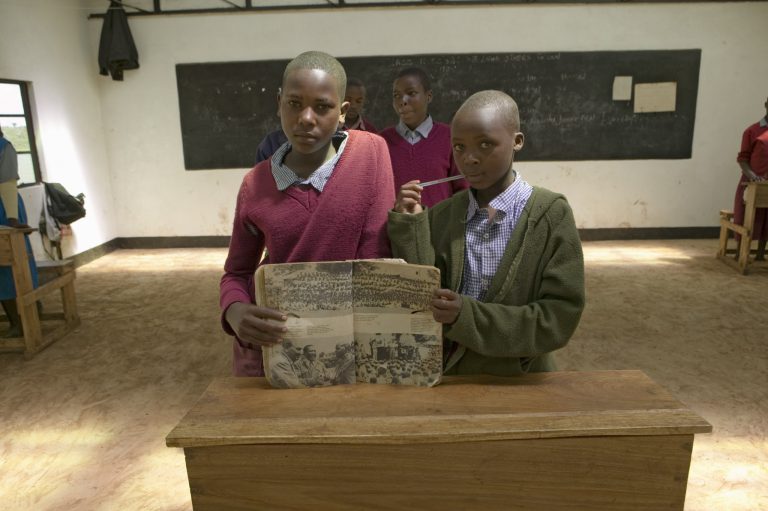
A new study by UNESCO’s Global Education Monitoring Report (GEM) proposes an economic model that would help reduce the cost of textbooks, increasing availability to school students in sub-Saharan Africa.
According to the paper, Every Child Should Have a Textbook, due to be issued today, centralised financing mechanisms could allow for a US$3 reduction in the price of each textbook, saving almost US$1billion a year from the cost of learning materials in sub-Saharan Africa alone.
The report argues that improved financial models could triple the number of textbooks available to children across the world, particularly in poor countries already hindered by the high cost of textbooks. Kenya, for example, could save US$64million from its textbook bill, Malawi US$33million.
Podcast with @GEMReport’s Asma Zubairi on new paper that shows a lack of #textbooks is holding back learning https://t.co/IJzEBetk1r
— UN Education Report (@GEMReport) January 19, 2016
A number of studies have already demonstrated the value of the textbook within the classroom; in Ghana, an impact evaluation programme supporting basic education found that progress in Mathematics and English test scores between 1988 and 2003 were partly due to the rising availability of textbooks.
Furthermore, a cross-country analysis of data from 22 sub-Saharan African countries showed that the use of textbooks greatly improves learning within core subjects. According to the data, providing a textbook for every student increased scores in literacy by 5-20 percent.
The model presented in the report suggests that countries start to centralise textbook acquisition and pool demand to facilitate long-term financing, which would, in turn, increase availability. A survey of primary schools in 11 developing countries proved that, on average, almost 20 percent of Grade 4 pupils do not have access to a textbook or have to share with classmates.
Our infographic shows how centralizing the #textbook market will reduce costs #Textbooks4All https://t.co/eN0fmR66lO pic.twitter.com/651YGtYRWM
— UN Education Report (@GEMReport) January 19, 2016
Results were even higher in other countries: only 31 percent of pupils in Paraguay and 51 percent in the Philippines had sole use of a Mathematics textbook. In Cameroon, there is only one reading textbook per 12 students, and only one Maths book per 14 students in the second grade.
“Next to a good teacher, well-designed textbooks in sufficient quantities are the most effective way to improve students’ learning,” said Aaron Benavot, Director of the GEM Report. “This has been recognised by some countries – notably Switzerland, Guatemala and Nicaragua – but many others have yet to follow.”
But according to data collected by UNESCO’s Institute for Statistics (UIS), governments are not currently investing enough into classroom textbooks. The research demonstrates that in 2012, 36 countries across all regions of the globe spent less than two percent of their primary education budget on teaching and learning materials. Sixteen of those countries spent less than two percent, while two (Kuwait and Malawi) spent more.
Cost of #textbooks is a key barrier to children accessing the learning materials they need @GEMReport https://t.co/JNP3lkeMp9 #Textbooks4All
— UN Education Report (@GEMReport) January 19, 2016
Low government investment results in parents having to fund textbooks for their children, creating inaccessibility to education among the world’s poorest families. Learning materials average over a third of total household spending on education in 12 African countries, and over 50 percent of spending on education within the poorest households.
The report recommends the forthcoming Global Book Fund to increase external textbook resources by following models similar to those used by the Gavi Alliance in fighting disease, which includes matched private-donor funding. Figures highlight that this could increase external funding in sub-Saharan Africa from US$549million to US$735million.
Overall, this approach has the potential to triple the number of textbooks available to children across the world.
“Unpredictable funding, a lack of transparency and no demand forecasting are contributing to an inefficient textbook procurement system,” added Benavot. “Forcing families to pay for their children’s’ textbooks is unacceptable. We must learn from health, and set up a new system so that textbooks can move cheaply and effectively from a printing house to school and into the hands of children.”
Image via Shutterstock.
Liked this? Then you’ll love these…
China provides US$60billion to fund Africa’s HE sector
Crowdfunding Platform Provides £100m for Prospective Asian and African MBA Students







